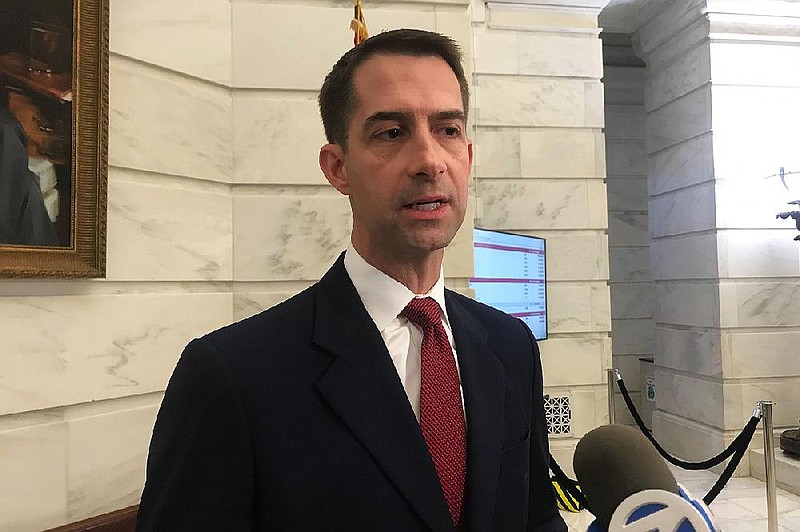WASHINGTON -- U.S. Sen. Tom Cotton, R-Ark., questioned the existence of systemic racism in the United States in an article published Monday, comments that were rebuked by members of the Congressional Black Caucus shortly after they appeared.
In the piece, titled "Is This the Last Stand of the 'Law and Order' Republicans?," Cotton dismissed the idea of pervasive law enforcement bias against blacks.
"I do not think you can paint with a broad brush and say there's systemic racism in the criminal justice system in America," the lawmaker from Dardanelle told Politico. "Can there be inequality? Can there be injustices in particular cases? Yes, there can be. But I do not think you can, nor should you, paint with such a broad brush."
The Politico article appeared one day before the funeral of George Floyd, a black man who died after a white Minneapolis police officer knelt on his neck for more than eight minutes.
A spokesman for Cotton confirmed that the Politico quotes were accurate but otherwise declined to comment.
[Video not showing up above? Click here to watch » https://www.youtube.com/watch?v=34B_tK45Iwg]
Cotton's remarks were similar to those made in recent days by Attorney General William Barr, Housing Secretary Ben Carson and other Republican leaders.
The Arkansas senator's words were rebutted by black lawmakers Monday.
Gathered at the Capitol to honor Floyd's memory and unveil law enforcement legislation, they insisted the problems are deeply rooted.
"All you have to do is look at the numbers of black men and women who've been murdered at the hands of police. All you have to do is look at the disparities in health care and housing, look at the disproportionate rates of poverty. When you look at the wage gap and you look at the wealth gap and you look at all the systemic issues that this country has not addressed yet, he's wrong," said U.S. Rep. Barbara Lee, D-Calif.
U.S. Rep. Al Green, D-Texas, said Cotton "refuses to see the invidious, institutionalized, systemic discrimination that exists in this country. He's never been black. He hasn't seen life through the eyes of a black man."
Green, 72, calls himself "a son of the segregated South."
"I had to go to the back door and get my food when I was a younger person. I had to ride in the back of the bus," Green said.
In law school, he was pulled over in a predominantly white community and had his car searched without cause, he said.
"It was a late hour. I'd done nothing wrong," he said. "When I asked why was this happening, they said, 'We thought your car was a stolen car.'"
Karen Bass, D-Calif., the caucus chairwoman, said statistical data -- not just anecdotes -- point to widespread racial discrimination.
"There's a ton written about systemic racism in the criminal justice system," she said. "Why are so many African Americans incarcerated? [Cotton] has to answer that."
U.S. Rep. Hank Johnson, D-Ga., said the evidence contradicts Cotton's position.
"He's simply wrong. He's profoundly wrong," Johnson said.
The Justice in Policing Act of 2020, unveiled by caucus members as well as House and Senate Democrat leadership, would, among other things, ban choke holds and certain no-knock warrants, while creating a nationwide database on police misconduct, supporters said.
Lawmakers predicted it would pass the Democratically-controlled House this year. Senate Minority Leader Chuck Schumer, D-N.Y., promised to push for passage on his side of the Capitol as well, though he'll need Republican votes in order to succeed.
Several recent polls reflect a partisan split when it comes to views on racism and law enforcement, with Democrats far more likely than Republicans to view the system as biased against black people.
President Donald Trump is among those portraying institutional racism as an aberration.
Asked Monday whether Trump believes there is "systemic racism," White House Press Secretary Kayleigh McEnany said: "He definitely believes there are instances of racism. ... He believes most of our police officers are good, hardworking people," and he has great faith in police departments.
Last week, former President George W. Bush released a statement suggesting the problems are more widespread.
"Many doubt the justice of our country, and with good reason. Black people see the repeated violation of their rights without an urgent and adequate response from American institutions," he wrote. "This tragedy -- in a long series of similar tragedies--raises a long overdue question: How do we end systemic racism in our society?"
